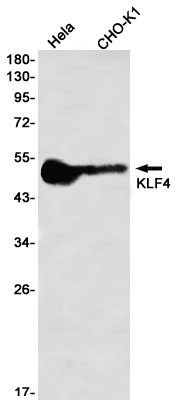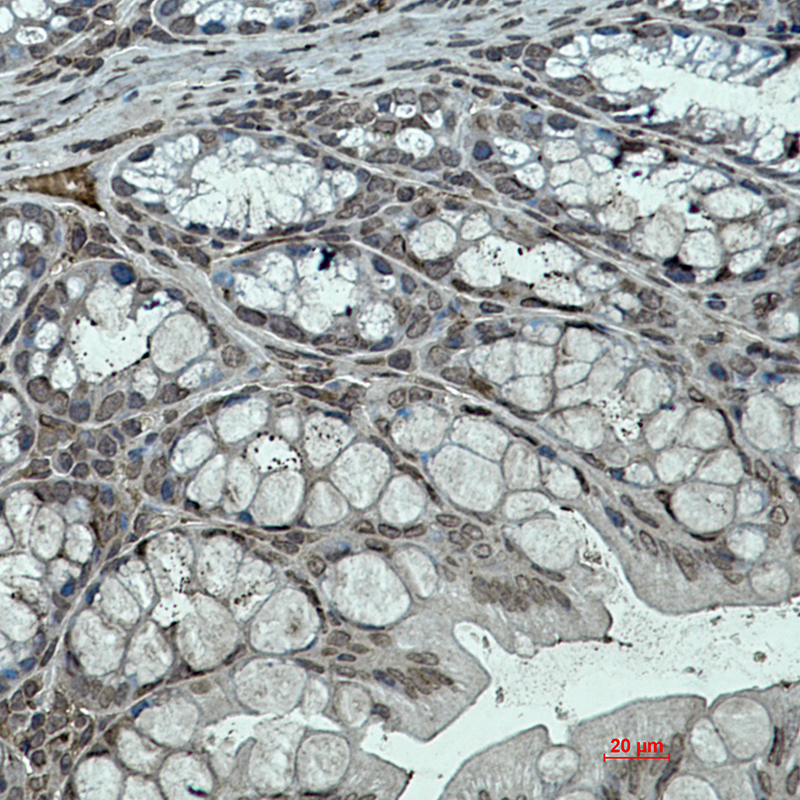

| WB | 1/500-1/1000 | Human,Mouse,Hamster |
| IF | 1/20 | Human,Mouse,Hamster |
| IHC | 1/50-1/100 | Human,Mouse,Hamster |
| ICC | 技术咨询 | Human,Mouse,Hamster |
| FCM | 咨询技术 | Human,Mouse,Hamster |
| Elisa | 咨询技术 | Human,Mouse,Hamster |
| Aliases | EZF; Zie; Gklf |
| Entrez GeneID | 16600 |
| WB Predicted band size | Calculated MW: 52 kDa; Observed MW: 52 kDa |
| Host/Isotype | Rabbit IgG |
| Antibody Type | Primary antibody |
| Storage | Store at 4°C short term. Aliquot and store at -20°C long term. Avoid freeze/thaw cycles. |
| Species Reactivity | Human,Mouse,Hamster |
| Immunogen | Recombinant protein of mouse KLF4 |
| Formulation | Purified antibody in TBS with 0.05% sodium azide,0.05%BSA and 50% glycerol. |
+ +
以下是3篇涉及KLF4抗体的文献摘要信息,供参考:
1. **文献名称**: "KLF4 is essential for induction of cellular identity change and acinar-to-ductal reprogramming during pancreatic cancer progression"
**作者**: Wei et al. (2020)
**摘要内容**: 该研究使用特异性KLF4抗体(克隆号:EPR3861)通过免疫组化(IHC)和Western blot验证KLF4在胰腺癌细胞中的表达,发现KLF4促进腺泡细胞向导管细胞转化,并揭示其在胰腺癌早期发展中的关键作用。
2. **文献名称**: "Antibody validation for specific detection of endogenous Kruppel-like factor 4 (KLF4) in human and mouse tissues"
**作者**: McConnell et al. (2015)
**摘要内容**: 文章系统评估了多种商品化KLF4抗体(包括Santa Cruz的sc-12578和Abcam的ab151733)的特异性,通过基因敲除(KO)细胞和免疫沉淀质谱分析,确认部分抗体在人和小鼠组织中检测内源性KLF4的可靠性。
3. **文献名称**: "KLF4 regulates adult endothelial cell regeneration through a PDGF-dependent mechanism"
**作者**: Zhou et al. (2018)
**摘要内容**: 研究利用KLF4抗体(Cell Signaling Technology, #4038)进行染色质免疫共沉淀(ChIP)和免疫荧光(IF),揭示KLF4通过调控PDGF信号通路促进血管内皮细胞再生的分子机制。
注:以上文献为示例性质,具体引用时建议通过PubMed或Google Scholar核对原文信息。如需更多抗体技术细节,可参考抗体供应商提供的技术手册(如CST、Abcam等)。
The Krüppel-like factor 4 (KLF4) antibody is a critical tool for studying the multifaceted roles of KLF4. a transcription factor belonging to the Krüppel-like family. KLF4 regulates diverse cellular processes, including proliferation, differentiation, apoptosis, and somatic cell reprogramming. Notably, it is one of the Yamanaka factors essential for inducing pluripotency in somatic cells, highlighting its importance in stem cell biology and regenerative medicine. KLF4 exhibits context-dependent functions, acting as a tumor suppressor in some cancers (e.g., colorectal and gastric cancers) or an oncogene in others (e.g., breast and squamous cell carcinomas), making its study vital for understanding cancer progression and therapy.
KLF4 antibodies enable the detection and quantification of KLF4 protein levels in techniques such as Western blotting, immunohistochemistry (IHC), immunofluorescence (IF), and flow cytometry. These antibodies are available in monoclonal or polyclonal forms, typically raised in hosts like rabbits or mice, and target specific epitopes within KLF4’s conserved zinc finger DNA-binding domain or regulatory regions. Validation via knockout controls or siRNA knockdown ensures specificity, minimizing cross-reactivity with other KLF family members.
Research applications span developmental biology, cancer mechanisms, tissue repair, and inflammation. KLF4’s involvement in maintaining stemness, epithelial-mesenchymal transition (EMT), and immune modulation underscores its therapeutic and diagnostic potential. Reliable KLF4 antibodies are indispensable for elucidating its dual roles in health and disease, driving advances in precision medicine and biomarker discovery.
×